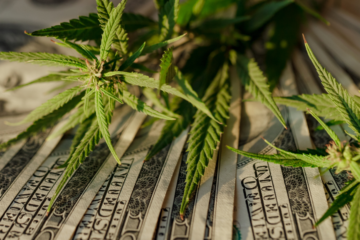Virginia is set to become the first Southern state to allow recreational marijuana sales, after lawmakers passed a bill that would create a regulated market by 2025. The bill now awaits the approval of Republican Gov. Glenn Youngkin, who has not indicated his position on the issue.
A Compromise Between House and Senate Versions
The bill that passed both the House of Delegates and the Senate on Wednesday was a result of a compromise between competing versions that were introduced at the start of the legislative session. The main difference was the timeline for launching retail sales, which the House wanted to start in 2024 and the Senate in 2025.
Under the final bill, the state would start taking applications for cultivating, testing, processing and selling marijuana on Sept. 1, 2024, and the market would open on May 1, 2025. The bill also sets a tax rate of up to 11.625% on marijuana products, which would generate revenue for public health, education and social equity programs.

The bill’s sponsors said they wanted to create a responsible and thoughtful framework for regulating marijuana, while giving the state’s $3 billion illicit market a run for its money. They also said they wanted to give Virginians access to a safe, tested and taxed product.
A Historic Step for Virginia and the South
Virginia became the first Southern state to legalize marijuana in 2021, when it allowed adults 21 and older to possess and cultivate the drug. However, retail sales were delayed due to political gridlock and policy differences. Currently, only home cultivation and adult sharing of marijuana are legal, as well as medical cannabis for patients with a doctor’s recommendation.
The bill to allow recreational sales is a historic step for Virginia and the South, where marijuana laws have traditionally been more conservative and punitive. According to the National Organization for the Reform of Marijuana Laws (NORML), Virginia is one of 19 states, plus the District of Columbia, that have legalized marijuana for adult use, and one of 36 states, plus D.C., that have legalized medical cannabis.
An Uncertain Future Under a New Governor
The bill’s fate now depends on Gov. Youngkin, who took office in January after defeating Democrat Terry McAuliffe in a close race. Youngkin has not expressed a clear stance on marijuana legalization, and has said he is not interested in the issue. He has also said he wants to focus on areas where he can find common ground with the Democrat-controlled legislature.
However, some advocates and lobbyists are hopeful that Youngkin will sign the bill, or at least not veto it, as he has not explicitly opposed it. They argue that the bill regulates an existing market, and that marijuana legalization is popular among Virginians. According to a poll conducted by the Wason Center for Civic Leadership at Christopher Newport University in January, 68% of Virginia voters support legalizing marijuana for recreational use.
If Youngkin signs the bill, or lets it become law without his signature, Virginia would join neighboring states Maryland and D.C. in allowing recreational marijuana sales. If he vetoes the bill, it would require a two-thirds majority in both chambers to override his veto, which is unlikely given the narrow margins of the bill’s passage.



